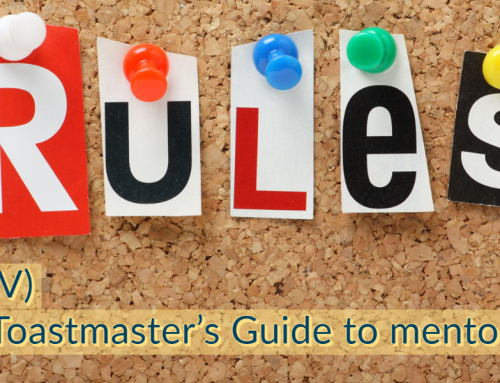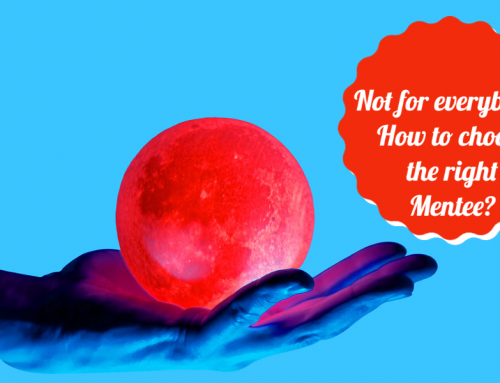Busy Toastmasters Guide to Mentoring
by Lukas Liebich, DTM
Why Bother with Mentoring
Some people say having a mentor changed their lives. Others say that it was their most rewarding experience in Toastmasters. Others (past International President Pat Johnson) even say she “Would not have stayed in Toastmasters without mentors.”
It seems like mentoring is a big deal!
No matter how far you are in your Toastmasters journey, if you plan to stick around for a while longer (and I have a hunch you do), you won’t escape it.
So, why not do it right?
There’s a lot of good material out there on mentoring in Toastmasters (type the words “Mentoring” and “Toastmasters” into Google). There’s even a whole path covering the topic with this series of articles.
I intend to give you something extra:
- A straightforward overview of a mentoring process with a defined start and finish
- Real personal examples of what worked – as well as what didn’t
- Links to references outside of the Toastmasters world
Busy Toastmasters Guide to Mentoring
In the next few months, I will add detailed descriptions for the individual “phases.” You can look forward to the following articles as new articles get published:
- Before it all starts: How to be a desired mentor?
Few people who join Toastmasters want to be just mediocre speakers. You wouldn’t want to be a modest mentor either, would you? This post will explain how to be better than that.
Not for everybody: How to choose the right mentee
Pineapples on a pizza, yes or no? Okay, this does not need to be the criteria for choosing your mentee. But you might benefit from having some. - First Meeting, Part One: The Rules
If you’re not the type to follow the rules, that’s fine. Still, it’s best to know them before you break them. - The First Meeting: The Goals and the Plan
Mentoring can be friendly chats and all that – but 95% of dentists* say that their satisfaction from mentoring increases when they set goals with their mentors. - What to do with your mentee?
Like a romantic relationship, mentoring can benefit from trying new things together. This post will give you plenty of inspiration. - Closing and Celebration
The most underestimated part of mentoring. If you do this, you’ll be a total rockstar.
But first things first. Why should you even bother?
Why Bother with Mentoring?
It feels good to be clever, to have the answers, to ask for help, and be considered an expert. Doesn’t it?
I remember the first time I was asked to become a mentor. I was 27 then and a Toastmasters member for less than half a year. After a club meeting where I gave a speech, Kazimira (not her real name), a lady in business attire, a couple of years older than me, came to me and told me: “Lukas, I really liked your speech – and right now I’m looking for a mentor. Would you have time?”
Before that, I didn’t think anyone would be interested in hearing my advice on public speaking, so I must admit, this request gave me a real ego boost. I just said, “Yes, sure,” without thinking.
The Pathways project “Prepare to Mentor” (part of Toastmasters Mentoring path) says: “Taking time to evaluate your reasons for choosing to mentor and assessing your expectations to be sure they are realistic will benefit you over time.” Then it also says: “Wait until you’re ready.”
I say: Don’t overthink it. With Kazimira, we had a great time, learned a lot from each other, practiced Table Topics, and later even served on the Club Exec committee together.
But I agree that it’s good to give your motivation some thought. The ego boost in being asked for advice was nice but made me too attached to my mentee following my advice. When Kazimira disagreed with me (which, naturally, happened more often as she became more advanced), I took it personally (can’t she see I know best?).
Such a mentor’s attitude damages the mentee, holding them back and creating unnecessary conflict.
Here are some alternative reasons why I think it’s great to be a mentor:
- It’s a way for me to build a relationship with an interesting person
Explaining something to my mentee is an opportunity for me to formulate my thoughts - It’s a way to get a partner-in-crime for your Toastmasters activities (e.g., Table Topics practice, speech rehearsals, or even organizing conferences)
A day will come when you have a mentoring session scheduled; you’ll find yourself tired and will hope your mentee will text you that they’re canceling. On such days, having a clear idea of why you decided to mentor in the first place will be good! Your reasons may differ – but yeah, try to think of something on top of “it feels nice to be asked for advice.”
Once you’re clear about your “why.” You’ll have the extra motivation needed to start working on becoming a desired mentor.
Until then!
**This number is not based on any research and is a complete fabrication by the author.
Lukas Liebich, DTM
![]()








